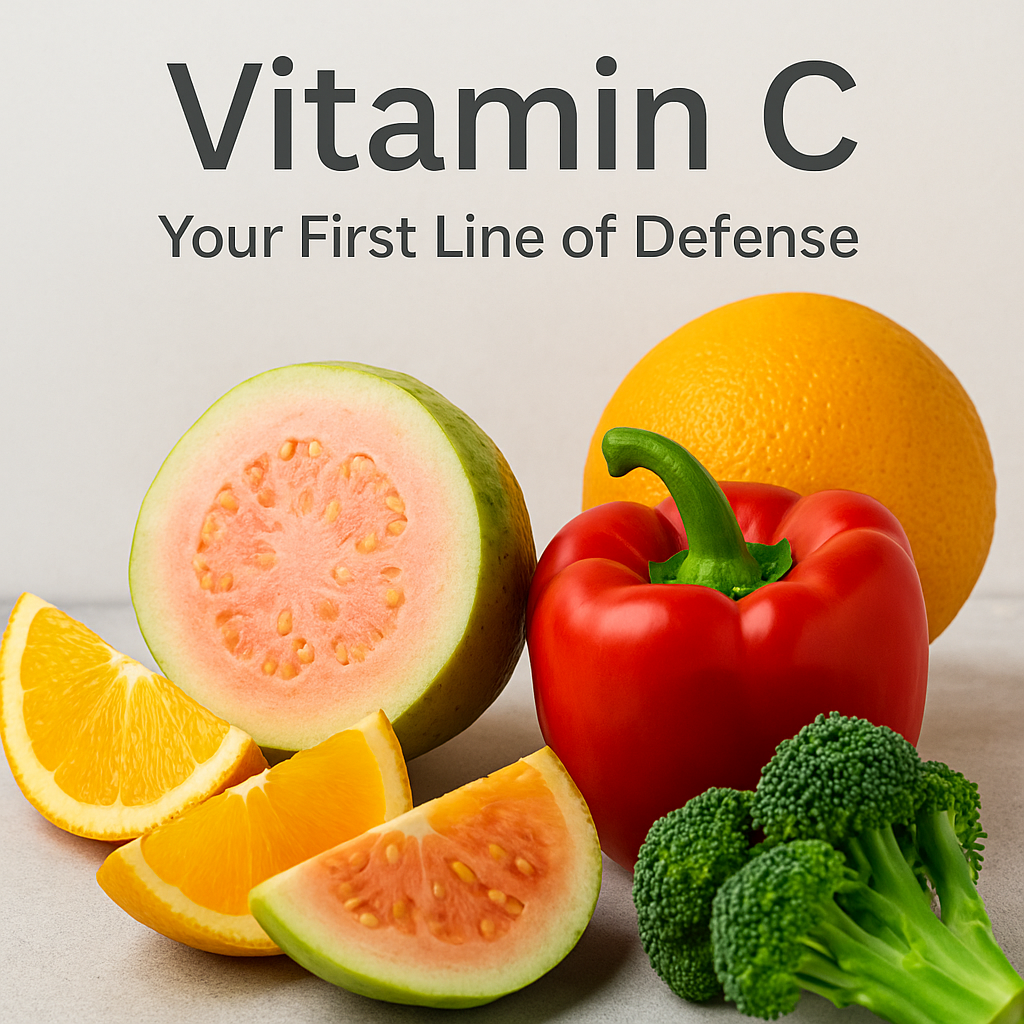
วิตามินซี แนวป้องกันด่านแรกของคุณ
วิตามินซี – แนวป้องกันด่านแรกของคุณ
ในโลกของสารอาหารจำเป็น มีเพียงไม่กี่ชนิดที่มีชื่อเสียงและถูกเข้าใจผิดมากเท่า วิตามินซี วิตามินซีเป็นที่รู้จักกันว่ามีบทบาทสำคัญต่อสุขภาพภูมิคุ้มกัน แต่แท้จริงแล้วมีส่วนเกี่ยวข้องกับการทำงานของร่างกายหลายอย่าง และแตกต่างจากสัตว์หลายชนิด มนุษย์ไม่สามารถผลิตวิตามินซีได้เอง ซึ่งหมายความว่าเราต้องได้รับวิตามินซีจากอาหาร และเราจำเป็นต้องได้รับวิตามินซีบ่อยครั้ง
วิตามินซีคืออะไร?
วิตามินซี หรือที่เรียกอีกอย่างว่า กรดแอสคอร์บิก เป็นวิตามินที่ละลายน้ำได้และเป็นสารต้านอนุมูลอิสระที่มีประสิทธิภาพ ช่วยปกป้องเซลล์จากความเสียหาย เสริมสร้างการสมานแผล และช่วยให้ร่างกายทำงานได้อย่างมีประสิทธิภาพ วิตามินซีแตกต่างจากวิตามินที่ละลายในไขมัน (เช่น A, D, E และ K) ตรงที่ร่างกายไม่สามารถเก็บวิตามินซีไว้ได้นาน ดังนั้นการได้รับวิตามินซีอย่างสม่ำเสมอจึงเป็นสิ่งจำเป็น
เพราะเหตุใดจึงจำเป็น

ต่อไปนี้เป็นเพียงบางส่วนของสิ่งที่วิตามินซีทำต่อร่างกายของคุณ:
เสริมสร้างระบบภูมิคุ้มกัน – ช่วยให้เม็ดเลือดขาวทำงานและปกป้องเซลล์จากความเสียหาย
สร้างคอลลาเจน – บำรุงผิว กระดูก ข้อต่อ หลอดเลือด และการสมานแผล
รองรับการดูดซึมธาตุเหล็ก – ช่วยให้ร่างกายของคุณดูดซึมธาตุเหล็กจากพืช (ไม่ใช่ฮีม)
ต่อสู้กับอนุมูลอิสระ – ปกป้องเซลล์จากความเครียดออกซิเดชัน
ช่วยให้สมองของคุณเฉียบคม – เกี่ยวข้องกับการผลิตสารสื่อประสาท (เช่น โดปามีนและเซโรโทนิน)
หากร่างกายได้รับวิตามินซีไม่เพียงพอ ร่างกายจะไม่สามารถรักษาโครงสร้างพื้นฐานหรือการป้องกันเอาไว้ได้
ใครต้องการมันมากที่สุด?
ทุกคนต้องการวิตามินซี แต่บางคนอาจต้องการมากกว่านั้น:
ผู้สูบบุหรี่ – การสูบบุหรี่ทำให้วิตามินซีลดลงอย่างรวดเร็ว
ผู้ที่อยู่ภายใต้ความเครียด – ความเครียดเรื้อรังจะเพิ่มความเสียหายจากออกซิเดชัน
ผู้สูงอายุ – การดูดซึมลดลงและความต้องการเพิ่มขึ้น
สตรีมีครรภ์และให้นมบุตร – มีความต้องการการเผาผลาญที่สูงขึ้น
ผู้ป่วยโรคเรื้อรัง – เนื่องจากการอักเสบและความต้องการซ่อมแซมเนื้อเยื่อที่เพิ่มขึ้น
เด็กยังต้องการการรับประทานอาหารที่สม่ำเสมอเพื่อการเจริญเติบโตและพัฒนาการภูมิคุ้มกันอีกด้วย
สัญญาณของการขาดสารอาหาร

การขาดวิตามินซีอาจไม่ได้สังเกตเห็นได้ชัดในตอนแรก ต่อไปนี้คือสัญญาณที่ควรสังเกต:
ความเหนื่อยล้าและพลังงานต่ำ
การสมานแผลช้า
เป็นหวัดหรือติดเชื้อบ่อย
เหงือกมีเลือดออกหรือฟันหลุด
ช้ำง่าย
ผิวหยาบ แห้ง หรือเป็นปุ่ม
อาการปวดข้อ
โรคโลหิตจางจากการขาดธาตุเหล็ก
ในกรณีที่รุนแรง: โรคลักปิดลักเปิด
โรคลักปิดลักเปิด — โรคที่ครั้งหนึ่งเคยพบบ่อยในหมู่ลูกเรือที่ขาดแคลนอาหารสด — เป็นเพียงระยะสุดท้ายของการขาดวิตามินซี โรคนี้ยังคงเกิดขึ้นได้ในปัจจุบันเมื่อการบริโภคอาหารเน้นอาหารแปรรูปมากเกินไป
หาได้จากที่ไหนในอาหารจริง
ข่าวดีก็คือ วิตามินซีมีมากในผลไม้และผักสด โดยเฉพาะเมื่อเป็นของท้องถิ่นตามฤดูกาลและปราศจากสารเคมี
| อาหาร | วิตามินซี (มก./100ก.) |
|---|---|
| ฝรั่ง | 230 |
| พริกหยวก | 120–160 |
| บร็อคโคลี่ (ดิบ) | 89 |
| มะละกอ | 61 |
| สตรอเบอร์รี่ | 59 |
| ผักคะน้า (ดิบ) | 93 |
| ส้ม | 53 |
| พริกขี้หนูไทย | 144 |
การปรุงอาหารอาจทำให้วิตามินซีลดลง ดังนั้นการรับประทานอาหารบางชนิดแบบดิบหรือปรุงด้วยไอน้ำเล็กน้อยจึงเป็นทางเลือกที่ดีที่สุด
คุณต้องการเท่าไหร่?
แม้ว่าคำแนะนำอย่างเป็นทางการจะแตกต่างกันไป แต่การตั้งเป้าไว้ที่ 500-1,000 มิลลิกรัมต่อสัปดาห์ (หรือ 70-120 มิลลิกรัมต่อวัน) ถือเป็นปริมาณที่เหมาะสมสำหรับคนส่วนใหญ่ ซึ่งทำได้ง่ายมากด้วย Real Food และยิ่งง่ายยิ่งขึ้นเมื่อถึงฤดูกาลฝรั่ง
ตัวอย่าง:
ฝรั่ง 1 ลูก (~250 กรัม) = วิตามินซีมากกว่า 500 มก.
เพิ่มบร็อคโคลี่ พริกหยวก และผลไม้รสเปรี้ยว — คุณก็พร้อมแล้ว
คุณควรหลีกเลี่ยงอาหารเสริมหรือไม่?
แม้ว่าโดยทั่วไปแล้วอาหารเสริมวิตามินซีจะปลอดภัย และมักใช้ในปริมาณสูงเพื่อการรักษา แต่ แหล่งอ้างอิงที่ดีที่สุดยังคงเป็นอาหารธรรมชาติ วิตามินซีธรรมชาติมีฟลาโวนอยด์และสารอาหารร่วมที่ช่วยเพิ่มการดูดซึมและลดผลข้างเคียงจากออกซิเดชัน
การได้รับยาเกินขนาดผ่านทางอาหารแทบจะเป็นไปไม่ได้ แม้แต่อาหารเสริมขนาดสูง (สูงสุด 2,000 มก./วัน) ก็ปลอดภัยสำหรับคนส่วนใหญ่ บางคนอาจมีอาการผิดปกติของระบบย่อยอาหารเล็กน้อยเมื่อได้รับยาในปริมาณที่สูงมาก แต่โดยทั่วไปร่างกายจะขับส่วนเกินออกทางปัสสาวะ
สั้นๆ: อาหารจริงก่อน อาหารเสริมเมื่อจำเป็น และไม่ต้องกลัวฝรั่งสด!
บรรทัดล่าง
วิตามินซีเป็นสารอาหารพื้นฐานสำหรับการรักษา ฟื้นฟู และซ่อมแซม ไม่ใช่แค่การหลีกเลี่ยงหวัดเท่านั้น แต่ยังช่วยสร้างร่างกายให้แข็งแรง ยืดหยุ่น และได้รับการปกป้องจากภายในสู่ภายนอก
ทานสด ทานตามฤดูกาล และดื่มด่ำกับวิตามินซีจากธรรมชาติ ดุจฝรั่งสุกสดๆ จากต้น
